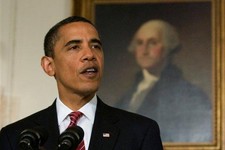BORN IN THE USA?
Seller claims Mombasa document 'certified copy'
By Bob Unruh
© 2009 WorldNetDaily
With dozens of lawsuits filed over access to Barack Obama's certified long-form birth certificate, many more lawyers working on his behalf to keep it secret and the validity of the U.S. Constitution hanging in the balance, guess where a "certified copy" of the original Mombasa "document" has been found?
On eBay.
Item No. 160344928067, at least as of today, is described as "a certified copy of President Barack Obama's Kenyan Birth Certificate."
The seller, identified by the user name " colmado_naranja," states, "President Barack Hussein Obama II was born in The Coast Provincial Hospital at Mombasa in Kenya at 7:24 PM on August 4th, 1961."
 eBay offer for Obama's Kenyan birth certificate |
The suspicion that Coast Provincial is, in fact, Obama's birth hospital is not new, with the subject having been discussed on both Internet blogs and forums already.
But the seller, who according to the eBay rankings has completed dozens of transactions on the behemoth auction site without difficulties, said this is the real deal.
The seller, who did not respond to a WND request for an interview, said online he was traveling in Kenya and repeatedly heard stories that Obama actually was born in Kenya.
| |
"Kenyans were amused at how gullible Americans could be when it came to obvious things like the fact that Kenyans overtly admit to Barack Jr's Kenyan birth, yet the Americans continue to believe that they know better," the seller writes.
"I delved further and found that a birth certificate was on file at The Coast Provincial General Hospital at Mombasa," said the seller, who claims the certificate is in Cedar Rapids, Iowa.
"I know several American expats that reside in Kenya. I asked the three that I could reach if they were aware of President Barack Obama's Kenyan birth. All three said that they were most obviously aware of his Kenyan birth. I was shocked. They went to further say that they weren't much concerned with it, after all they'd left the U.S. to start a new life abroad and didn't have much interest in what was taking place in the States. Besides, they said, who would believe them anyway?
"Along with my Congolese brother Andylenny (brother in heart, not blood) and a 1993 BMW with only one working door I was off to Mombasa to get myself a copy (certified I hoped) of Barack Jr's birth certificate," the seller reported.
Actual details of how the "certificate" was obtained are not reported.



![[POTOMAC WATCH]](http://s.wsj.net/public/resources/images/ED-AJ739_pw0626_D_20090625164456.jpg)
![[Review & Outlook]](http://s.wsj.net/public/resources/images/OB-DX990_WAXMAN_D_20090624185656.jpg)